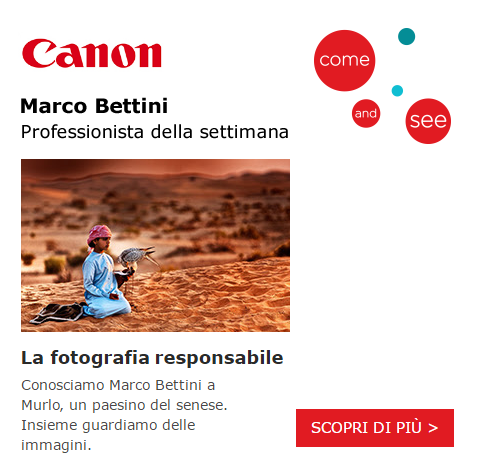
CANON (October 09, 2016)
Marco Bettini
Professional Photographer of the week
The responsable photography
La fotografia responsabile
We knew Marco Bettini in Murlo, a village near Siena, we looked together at some images. He observes, scrutinizes, flips, comes back and reflects. He stops, the restarts: he is inside all that he is looking at. Every comment is addressed with caution, almost that before arriving to a photographic sense, it is necessary asking questions on photography, on his own way living it. Marco lived in photography, but also with it. Throughout his life photography has coexisted alongside him as a good friend. What he tells us, it was born from there, from a relation where many things are known and other remain in the abstract, capable of inducing emotions and not logical ruminations. As a matter of fact in Marco’s career we do not find cause and effect relation, just a slow becoming, where learning comes later, when it is the friend who train him or simply his curiosity. Marco has always lived photography as a place to explore, without violence, thus forgetting what can be taken with force, but exalting himself, when the research had his own beat, enhancing the drive. Today he wants live another image, which perhaps it is also the same as before, but which still rests on an amateur instinct. In addition to technical, over time, Marco gained the sense of his mission, the passion that burned inside him. It was born a sense of respect, that still manages to dedicate ourselves, when we look at his pictures. It is not about awareness or even self-complacency, but of pure responsibility. It is a great merit.
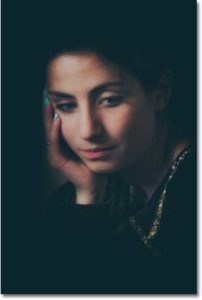
Q) Marco, when did you start to photograph and why?
A) I was 20 years, as an amateur. I approached photography thanks to some friends and since 1988 I became professional.
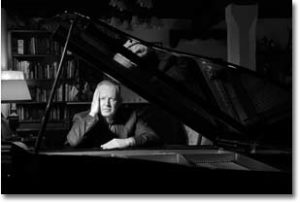
Q) Was your passion?
A) Yes, everything began because of a great motivation, with my friends I shared the desire to portray the nature and the environment. I come from a family of hunters from “Maremma” in Tuscany, that directed me more towards this kind of photography. Up to 29 years I traveled around Europe chasing the animals and I dedicated almost every weekend to them. I had to carve out the spaces of time that fit into my activity of that period.
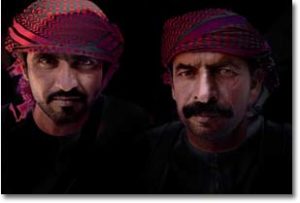
Q) Passion and friendship, then…
A) Right, but also meetings. When I was 30 I knew Guido Rossi, at that time he was manager of Image Bank. I was back from a trip to Scandinavia and I had some photos to show him. He asked me: “Are you able to take one thousand of these a month?”. “No” I replied. “I take pictures when I am on vacation”. Guido replicated: “I can not archive 200 images only”. And he added: “If you want to take this job, you have to throw everything behind”. So I did one or two years later. I leaned on a friend who had taken a course in industrial photography . So I started to get in touch with furniture companies, attending other operators like me I learned a trade.
Q) It is nice to turn to other colleagues. It is a sign of respect…
A) I frequented many industrial studios. In one of these I met Mario Ciampi. He took me in sympathy. A friendship was born that still lasts. I brought him my “homework” to correct. Under his protective wing I learned a lot, mostly the knowledges on furnishing.
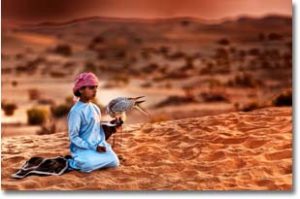
Q) There has been a surge in your career? A moment when things did radically change?
A) I do not know what are you referring to, I can tell you that on 1997 through a friend from Treviso I moved to Friuli Venezia Giulia and there I found more interested customers, more important companies. This permitted me to learn the necessary quality for my job. It started for me a beautiful period, in which, however, I have always kept another curiosity. I enjoy with photography, it represents for me a way of expression.
Q) From Tuscany to Friuli, then…
A) Up to Russia. My new customers allowed me to widen my horizons, giving me an interesting life experience and together with the opportunity to travel, my dreams were also realized. As well I had set up a studio at home, where I performed photographic portraits and where I experienced. Photography for me never represented a compartmentalized activity. I was dedicated to photography 24 hours a day.
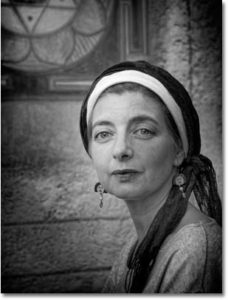
Q) Today you have open a gallery in Volterra…
A) Economical situation began to change. With the crisis I tried to exploit another part of me, reinventing my being a photographer. The advent of digital changed the required skills. It was not more necessary to organize the set or create the environment, other instruments were born. Here is the idea of the gallery. Here in Tuscany I am not the only one photograph showing his pictures. Other colleagues have been working for years, so I told myself: “Why should not I do it too?”. The idea and the aspiration is to find the resources to go back to travel. I miss the world. With my gallery I found the space and the dimension to show my pictures, my vision of existence.
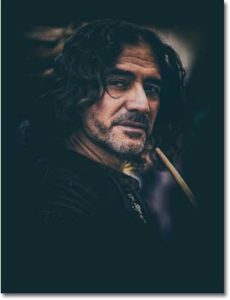
Q) I return to the passion: was it important for you?
A) Of course, everything started from there. I am not an intellectual, but I had the chance to met people who made me appreciate photography, every day more. I discovered a world of emotions. With my eyes I see the photography. As Mario said: “ the image is already there, it is just about seeing it”. As a matter of fact it is so, it is not like in the cinema, where everything has to be created.
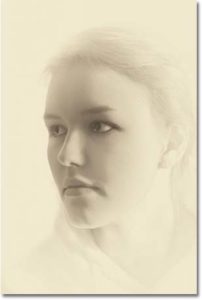
Q) Did you have any inspiring elements?
A) I have always dedicated myself to portraiture, especially to women. I remember an interview addressed to Helmut Newton (a genius). They asked him: “Why do you photograph always beautiful women?”. “I try to take them to bed” he answered. I am joking of course. I do not want to compare myself to the Berlin photographer, but portraying women is easier. What can I say? Perhaps I am just a bit childish, but after twenty years of industrial photos I want to have fun. I am proud of what I managed to do. The photographer is a job for rich people and I succeeded in living decorously.
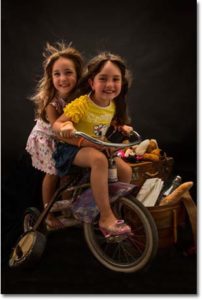
Q) Marco, how did you take care of your training?
A) As self-taught man, making mistakes and throwing away millions of material. I did not have a teacher and I entrusted myself to experimentation. After so many years, something entered inside me.
Q) You started with the analog, do you have any regrets about the film?
A) For the rates they paid us. The photographers were the owners of the steam. One of my colleague said: “We are the only ones we look at in the dark”, this is a great truth. The professional analog was made of shots, with big formats: 10×12, 20×25. We were few who could satisfy certain customers.
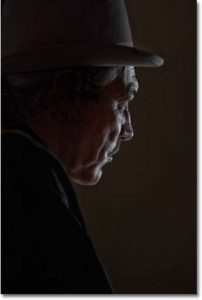
Q) Do you personally take care of the post production?
A) Yes, I do. Also the print, up to the basic format of 60. I am not very good, but good enough.
Q) Is there an optic that you preferentially use?
A) It depends from subjects. I use a little bit all lenses, from the wide angles pushed to the 600 mm. Even for the landscapes I often use very long lenses. Let’s say I have no rules. For the portraiture I often use the 100 – 300 mm. Mario Ciampi taught me to build an image close to what a person see. He told me about perception, about vision. I tried to make my own the considerations that addressed me, even if his culture, he is an architect, was difficult to permeate.
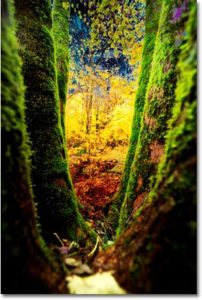
Q) Among yours, is there an image that do you particularly love?
A) Yes, there is, but I do not want to talk about it, is too intimate. I do not really have a favorite image. If I work hard I could remember all the shots I have taken in my lifetime. Recently I approached people. I like people, but also architecture and cities. I think I can define myself as a craftsman, but he is involved in a difficult area such as photography.
Q) After many years of service, is there a project left behind and you would like to complete?
A) There is something that I have never managed to get started. I am referring to the social. I admire for this the works of Paolo Pellegrin. He does what he loves.
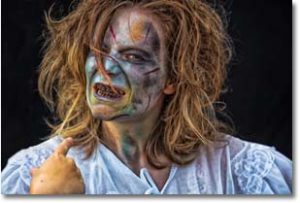
Q) Color or black and white?
A) Very good question. Both. The color definitely. I admire for this his great interpreter: Ernst Haas. I have dreamed of black and white in the dark room and with it I often deal with portraiture, because it is metaphysical, transcendental. I do not know about the landscape, it depends.
Q) If you could choose, which photo would you take tomorrow?
A) I would like to be in Syria, in Palestine. I would like to complete a work that can deepen the social themes.
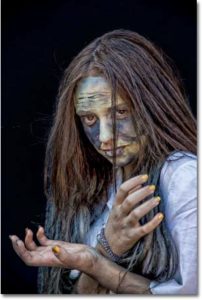
Q) Which is in your opinion the quality that a photographer like you must possess?
A) Curiosity and then a sort of responsibility. A photographer is a witness of his time also and especially when he photographs everyday life.
He does not embody only a trade, but he must show a vocation, the sense of a mission. There is temporal testimony in the middle. All this creates a moral tension that goes beyond aesthetics. After all great photographers show us things that most people can not even see.
Q) I feel a great respect for photography…
A) Without a camera in my hands I feel naked. Time ago I use to work in 6×7, seeing me at work they told me: “did you see yourself? It seems you are engulfing the camera, you are inside”.
Q) If you could give a wish to yourself, what you would say?
A) I would like my time to end while I shot !
Canon Italia


 Italiano
Italiano